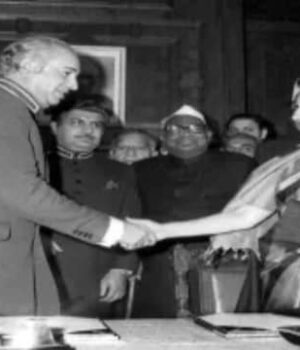SOURCE ; NEW18
Last Updated:April 25, 2025, 10:50 IST
The Shimla Agreement was a peace treaty signed on July 2, 1972, between Prime Minister Indira Gandhi and Pakistan Prime Minister Zulfikar Ali Bhutto in Shimla, Himachal Pradesh.
Then Prime Ministers Indira Gandhi and Zulfikar Ali Bhutto signed the Simla Agreement | File Image
Simla Agreement: Pakistan threatened to revoke all bilateral agreements with India, including the 1972 Simla Pact that validates the Line of Control in Jammu and Kashmir and Ladakh, following New Delhi’s intensified response to the Pahalgam terror attack.
In a strong diplomatic retaliation, India ordered all Pakistani nationals to exit the country by April 29 and suspended all categories of visas, including medical and diplomatic ones issued under the SAARC scheme. Further, New Delhi announced a suspension of the Indus Waters Treaty — a landmark 1960 agreement that endured many wars and hostilities.
related stories
Mirroring India’s actions, Pakistan Prime Minister Shehbaz Sharif chaired a National Security Committee (NSC) meeting on Thursday to take several decisions and said that they “Shall exercise the right to hold all bilateral agreements with India, including but not limited to the Simla Agreement in abeyance.”
All About Simla Agreement
The Shimla Agreement was a peace treaty signed on July 2, 1972, between Prime Minister Indira Gandhi and Pakistan Prime Minister Zulfikar Ali Bhutto in Shimla, Himachal Pradesh.
It aimed to settle the cross-border disputes between the two countries by establishing the Line of Control and marking the deployment positions of Indian and Pakistani forces.
The treaty said to “put an end to the conflict and confrontation that have hitherto marred their relations and work for the promotion of a friendly and harmonious relationship and the establishment of durable peace in the sub-continent.”
The settlement was the result of the December 17, 1971 ceasefire that ended the 14-day war with India’s decisive victory. However, the Pakistani side has flouted its commitment many times in the past when it comes to the Simla Agreement.
Here are some major instances:
Kargil War (1999)
Pakistani soldiers and militants infiltrated Indian territory in 1999, occupying strategic positions along the Line of Control in the Kargil sector. The move triggered a sharp response from the Indian side, with on-ground military actions. India successfully took control of the territory occupied by Pakistan after weeks of battle.
It violated the Simla agreement as the pact committed both countries to respect the LoC and resolve issues through peaceful dialogue. The infiltration led to a full-scale conflict, undermining these commitments.
Regular Ceasefire Violations:
The Pakistani side made a mockery of the Simla Pact with their frequent nature of shelling and firing across the Line of Control. The Shimla Agreement emphasized respecting the LoC and maintaining peace.
The ceasefire violations with cross-border firing and shelling often result in civilian and military casualties on both sides and displacements of border residents.
Today, on April 25, a ceasefire violation was reported in the Nowgam sector of Handwara in the Kupwara district. A similar nature of the incident was reported near Bandipora where Pakistani forces took to firing across the Line of Control.
Also Read: Pakistan Opens Fire At Multiple Locations Along LoC As Army Chief Visits Srinagar; India Retaliates
Global Mediation On Kashmir Issue
Pakistan has consistently brought up the Kashmir issue, including its territorial claims, at global platforms like the United Nations and the Organisation of Islamic Cooperation (OIC).
Islamabad has also engaged in bilateral discussions on the Kashmir issue with countries such as China and the United States, breaching the Simla Agreement, which mandates that all issues between India and Pakistan be resolved bilaterally.
Article 1 of the pact reads: “The two countries [India and Pakistan] have agreed that the principles and purposes of the Charter of the United Nations shall govern the relations between them. The two countries shall settle their differences by peaceful means through bilateral negotiations or by any other peaceful means mutually agreed upon.”
Cross-Border Terrorism
While many see Pakistan and cross-border terrorism as synonymous terms, India has repeatedly borne the brunt of such incidents in the past.
From the 2001 Parliament attack, masterminded by the Pakistan-backed terrorist group Jaish-e-Mohammed, to the 2008 Mumbai attacks, carried out by Lashkar-e-Taiba, another terror organisation supported by Islamabad, Pakistan’s role in cross-border terrorism has frequently been exposed.
The acts of cross-border terrorism conducted by Pakistan-based operatives clearly violate Article 1 of the agreement, which emphasises mutual respect for each other’s territorial integrity and the avoidance of hostile actions. Supporting and permitting terrorist activities directly are contradictory to the pact’s clauses.
Simla agreement’s Article 1 read: “The two countries will not allow their respective territories to be used for activities detrimental to the security of the other. The two countries will respect each other’s territorial integrity and sovereignty, and refrain from hostile actions or the use of force, and undertake to settle their differences by peaceful means through bilateral negotiations.”
After repeated violations of the agreement with India, Pakistan has now said it shall exercise its right to hold the Simla Agreement, which many see as a broken pact.
- Location :
Jammu and Kashmir, India, India




